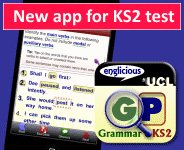Glossary: tense
Explanation
Tense is a grammatical notion, and refers to the way that time is encoded in language, typically through verb endings (inflections).
In English, tense is the choice between present tense and past tense verbs, which is special because it is signalled by inflections and normally indicates differences of time. In contrast, languages like French, Spanish and Italian have three or more distinct tense forms, including a future tense. (See also: future.)
The simple tenses (present and past) may be combined in English with the perfect and progressive.
- He studies. [present tense – present time]
- He studied yesterday. [past tense – past time]
- He studies tomorrow, or else! [present tense – future time]
- He may study tomorrow. [present tense + infinitive – future time]
- He plans to study tomorrow. [present tense + infinitive – future time]
- If he studied tomorrow, he’d see the difference! [past tense – imagined future]
Contrast three distinct tense forms in Spanish:
- Estudia. [present tense]
- Estudió. [past tense]
- Estudiará. [future tense]
Englicious contains many resources for English language in schools, but the vast majority of them require you to register and log in first. For more information, see What is Englicious?

